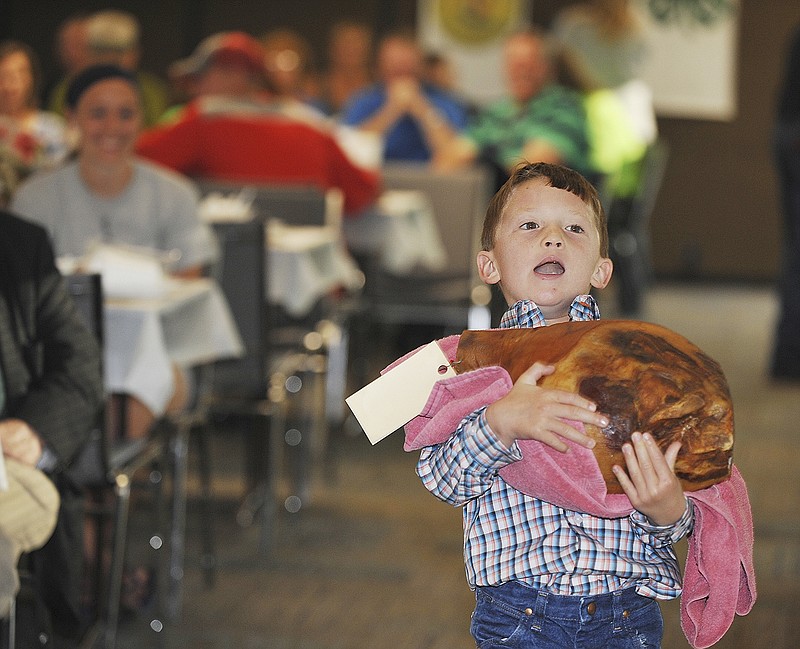It wasn't the ham judged to be the fair's "grand champion."
But state Sen. Mike Kehoe, R-Jefferson City, paid $1,200 for one ham sold Friday morning at the annual Jefferson City Jaycees Cole County Fair Ham Breakfast.
As Dawson Lackman of the St. Thomas 4-H club began to show his ham for the auction, Auctioneer Bill Gratz announced: "I hope you all bid good on this ham. Because young Mr. Lackman is going to donate the proceeds of this ham to Bradley Gilbert, a young boy at Blair Oaks who's got cancer."
In just 65 seconds, the bidding climbed to the $1,200 price.
Kehoe said later: "Our family's like others - we've had our share of losses, including my sister and, most recently, my mother-in-law.
"So, I think everybody's heart was touched when that young man decided to take those proceeds and donate it to a friend who's fighting bone cancer."
Normally, the winning bid on each ham goes to the student who did the curing project, and gets used for spending money or set aside for school.
Jenny Flatt, the University of Missouri Extension's 4-H Youth Specialist who oversees the students who enter the Jefferson City Jaycees Cole County Fair, said none of the sponsors knew about Lackman's plan to donate the money until Friday morning.
"It was a very moving choice - and that's the kind of kids that we have in 4-H and FFA - the kind of kids who are going to do for others before they do for themselves," she said.
Lackman left the breakfast before he could be interviewed, but his mother, Missy Rackers Lackman, posted a note on Dawson's Facebook page, saying she was "very proud" of his decision.
"Dawson walked out (of the breakfast) with an additional $300 from other folks who were proud of him too," she wrote, listing those donors as MFA (Meta), Leo Schulte of Schulte Dairy and Ray and Shirley Volmert.
Flatt told the News Tribune: "I am proud that we have a community of buyers who are supportive of the people in their community."
Gilbert was diagnosed this month with Stage 4 Ewing Sarcoma, which the website WebMD.com describes as both "the second most common bone cancer in children, but it's also relatively uncommon. It accounts for only 1 percent of all childhood cancers."
If found early enough, the website added, "Ewing's sarcoma can be treated successfully in 50 percent to 75 percent of cases."
Including Kehoe's $1,200 for Lackman's ham, Friday morning's breakfast raised $24,000 for 70 Mid-Missouri 4-H and FFA students.
Ten individual politicians and two county agencies bought 18 of those hams, spending a total of $6,825 (including Kehoe's $1,200).
Another 18 hams were bought by eight area banks, spending a total of $6,175.
Community Point Bank of Russellville and Eugene bought five for a total $1,625, while Hawthorn and Central Banks each bought three hams.
And four hams were sold to men Gratz identified as a "grandpa" of the student.
Kurtis Brickey, 17, who will be a senior at Jefferson City High School this year, was one of those winners as his father's father, Larry Brickey, paid $500 for his ham.
"I just started with FFA. I got into it because I enjoyed the ag classes, and stuff," Kurtis explained. "I liked it and enjoyed the activities and stuff."
While he also raises chickens, Kurtis said he tackled the ham curing project because his mother's father "always cures hams and stuff, so I figured I'd give it a try."
Flatt said the ham and bacon curing projects are one of many ways students learn to grow.
"We have kids who are committed to learning about things that, sometimes we knew from the olden days, but are still very important to know," she explained. "I actually did some contest judging for another county (recently) and, what I didn't realize was how many times you take that ham, put it up, take it down and wash it, rinse it, treat it, cut it, trim it - there's a process to it and there's learning that happens about it," including learning "about different cures and about the process about altering that cure to have a different taste and flavor."
They also learn marketing and promotional skills, as they seek to line up buyers before the annual breakfast and auction during Fair week.
"I have a lot of kids who either will come visit me personally, or send me letters and ask me to bid on them," Cole County Eastern District Commissioner Jeff Hoelscher explained after paying $375 for one ham. "The one that I do win, I pay for it out of my own pocket. I don't use campaign funds for that."
He's also helping to buy another ham, which he bid $450 for on behalf of the three-member county commission.
"Presiding Commissioner Marc Ellinger said it might be a good idea if the commissioners bought the grand champion of the Cole County-Jaycees Fair," Hoelscher said, noting the commissioners are sharing the cost personally - it's not coming from tax funds.
"We might have started a tradition - we'll see what happens," he added.
Most of the hams were bought by individuals, or by people representing area businesses.
Kehoe has been buying hams at the annual breakfast for nearly 25 years, and said it's important for area business people to be involved.
"I think it's a great program for these kids - they learn a lot from this, and I like the responsibility factor, and I like to see the kids market their products," he said. "The families of 4-H kids are very loyal people.
"When you invest in their kids and grandkids, they don't forget it, and I think businesses should be out here and should invest in these products - because it's not only good for the apparent value of teaching a kid the lesson of how to raise something, but it's also a good investment for your business."

